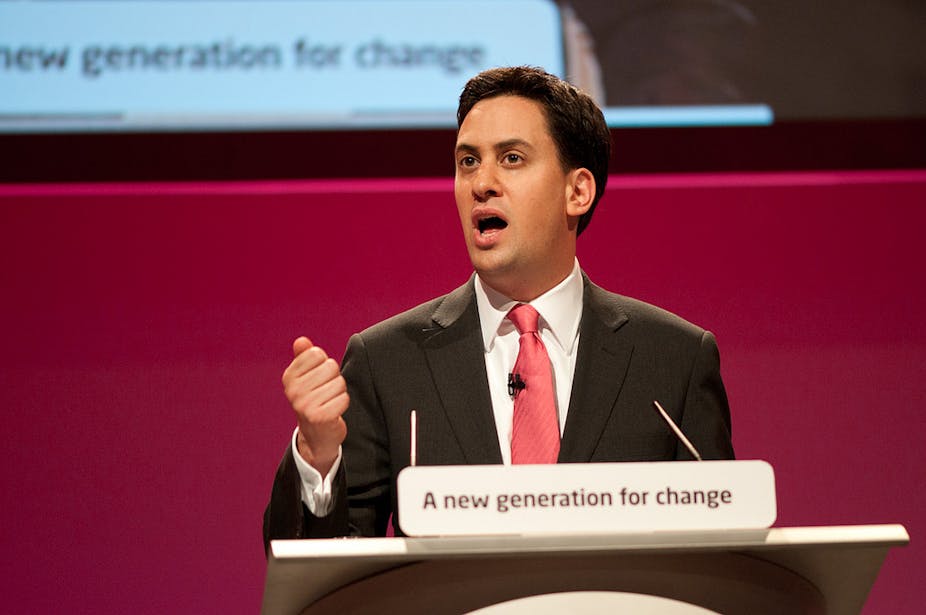The past few weeks must have seemed like an eternity for Ed Miliband. What appeared to be a spat between Labour and Unite over vote-rigging has turned into a public argument over party funding and a redefinition of the relationship with the unions. Now Miliband is turning up the heat on the debate by calling a special party conference in the spring to push through his reforms.
This is a big gamble as the unions hold 50% of the conference vote. This is something else Miliband plans to change by reducing the unions’ vote to 33% of the electoral college. To many in the Labour party Miliband is picking an unnecessary fight with the unions.
Miliband has claimed that he wants to “mend rather than end” the relationship with the unions. From the unions’ point of view it is difficult to see how the proposals will achieve this. The attempt to strengthen the links with individual members comes at a price for both sides. For Labour the reforms add to their financial woes, for the unions the individualisation of party membership pushes them further toward the margins.
Unions in decline
In recent decades the unions have been marginalised in the workplace, particularly in the private sector, through the decline of collective bargaining. Now they see themselves being rejected by the political party they created.
Currently, members can opt out of the political fund by requesting their contributions are not donated to Labour. It has been argued that it will be as easy for a union member to opt in to the political fund. That may be the case but the change of system will inevitably lead to union members thinking very carefully before giving away part of their hard-earned wages to a party that appears to be intent on weakening its links with organised labour. A recent survey of 712 members of Unite found that only one in three would opt into the political fund.
On paper the political fund levy is small – in Unite it is 66p per member per month – but this adds up to a substantial amount annually. Earlier this year Unite conducted its statutory 10-year ballot to retain the political fund; the turn-out was an unimpressive 18.6% but of those voting more than 87% voted in favour of retention.
It should also be noted that the political fund does not need to be handed over to the Labour party, it simply needs to be used for political purposes, and this could conceivably be campaigning against Labour over unpopular policies through advertising or supporting independent Labour candidates.
The future direction of Labour is set out clearly by Owen Smith, who recently in the New Statesman, described the reforms as a “historic attempt to make Labour a true people’s party once more”. Karl Marx was pessimistic about the sectional interests of unions hindering the betterment of broader society; it appears that Labour feels the same way.
Learning from Blair
This begs the question; why has Labour decided to cast the unions adrift and to appeal to individual members now? The answer is very clear; Miliband has learned the lessons of the 1980s and 1990s. Like it or not, there is little room for hard-left politics in Britain today. The social and political landscape has changed; a party that is seen as being influenced, if not dominated, by the union paymasters will be unelectable.
Tony Blair realised this and through centre-left policies, and the retention of Conservative union legislative reforms, paved the way for Labour to win three successive general elections. It is paradoxical that such an achievement attracts boos and hisses from the assembled masses whenever his name is mentioned at the Labour party conference.

Recently Len McCluskey stated there was “no civil war” within the labour movement. That is hard to believe; McCluskey and Paul Kenny of the GMB are certainly not overly enthusiastic about Miliband’s reforms. In recent weeks McCluskey has ricocheted from unwavering support of Miliband (“there can be absolutely no question about who runs the Labour party: it is Ed Miliband and he has my full support”) to outright condemnation (“no trust” in the party administration) and threatening legal action in response to an alleged smear campaign.
Hearts and minds
The ideological battle between Labour and labour is further characterised by the mutual dislike between McCluskey and Kenny and the “purple ties” of Progress, the right-wing supporters of the Labour party funded largely by Lord Sainsbury and highly supportive of Miliband.
Progress has openly criticised the emergence of Unite as a “super-union” attempting to operate a party structure from a bygone age. Perhaps it is time for the unions to take stock of their achievements in the last 100 years. To take pride in what they did, both in the workplace and in Westminster, in transforming the lives of working people in Britain. But also time to look forward rather than back, to tackle the perpetual problem of falling or stagnant union membership which threatens their survival and relevance.
It is entirely possible that Miliband’s reforms will have a positive effect on individual membership of the party. Some may be encouraged to join as they find the prospect of Labour no longer being indebted to and controlled by the unions appealing, although it’s doubtful there will be sufficient individuals to replace those lost from the union affiliation.
What is abundantly clear is the reforms proposed by Miliband were drawn up in haste; they lack detail and substance and clearly do not have the backing of the unions. Labour has set its course for the centre-left and, with the next election only 20 months away, will not want deviate from it now for fear of another five years in opposition. Whatever the weather, the coming winter may well be a cold one for the unions.

